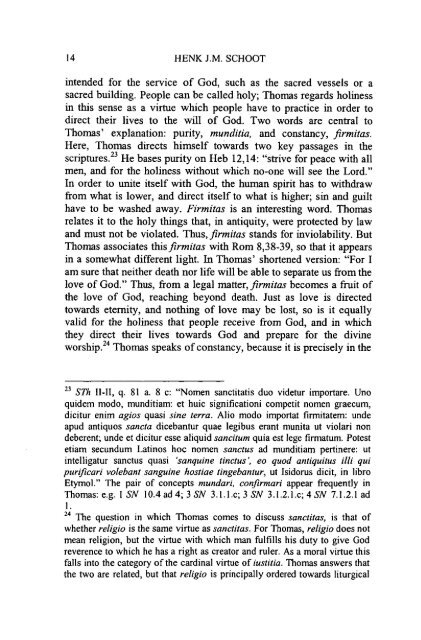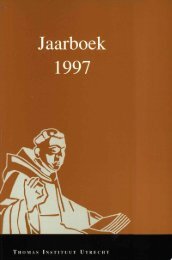Jaarboek Thomas Instituut 2006 - Thomas Instituut te Utrecht
Jaarboek Thomas Instituut 2006 - Thomas Instituut te Utrecht
Jaarboek Thomas Instituut 2006 - Thomas Instituut te Utrecht
Create successful ePaper yourself
Turn your PDF publications into a flip-book with our unique Google optimized e-Paper software.
14 HENK J.M. SCHOOT<br />
in<strong>te</strong>nded for the service of God, such as the sacred vessels or a<br />
sacred building. People can be called holy; <strong>Thomas</strong> regards holiness<br />
in this sense as a virtue which people have to practice in order to<br />
direct their lives to the will of God. Two words are central to<br />
<strong>Thomas</strong>' explanation: purity, munditia, and constancy, firmitas.<br />
Here, <strong>Thomas</strong> directs himself towards two key passages in the<br />
scriptures." He bases purity on Heb 12,14: "strive for peace with all<br />
men, and for the holiness without which no-one will see the Lord."<br />
In order to uni<strong>te</strong> itself with God, the human spirit has to withdraw<br />
from what is lower, and direct itself to what is higher; sin and guilt<br />
have to be washed away. Firmitas is an in<strong>te</strong>resting word. <strong>Thomas</strong><br />
rela<strong>te</strong>s it to the holy things that, in antiquity, were pro<strong>te</strong>c<strong>te</strong>d by law<br />
and must not be viola<strong>te</strong>d. Thus, firmitas stands for inviolability. But<br />
<strong>Thomas</strong> associa<strong>te</strong>s this firmitas with Rom 8,38-39, so that it appears<br />
in a somewhat different light. In <strong>Thomas</strong>' shor<strong>te</strong>ned version: "For I<br />
am sure that neither death nor life will be able to separa<strong>te</strong> us from the<br />
love of God." Thus, from a legal mat<strong>te</strong>r, firmitas becomes a fruit of<br />
the love of God, reaching beyond death. Just as love is direc<strong>te</strong>d<br />
towards e<strong>te</strong>rnity, and nothing of love may be lost, so is it equally<br />
valid for the holiness that people receive from God, and in which<br />
they direct their lives towards God and prepare for the divine<br />
worship.i" <strong>Thomas</strong> speaks of constancy, because it is precisely in the<br />
23 STh II-II, q. 81 a. 8 c: "Nomen sanctitatis duo videtur importare. Uno<br />
quidem modo, munditiam: et huic significationi competit nomen graecum,<br />
dicitur enim agios quasi sine <strong>te</strong>rra. Alio modo importat firmita<strong>te</strong>m: unde<br />
apud antiquos sancta dicebantur quae legibus erant munita ut violari non<br />
deberent; unde et dicitur esse a!iquid sancitum quia est lege firmaturn. Po<strong>te</strong>st<br />
etiam secundum Latinos hoc nomen sanctus ad munditiam pertinere: ut<br />
in<strong>te</strong>lligatur sanctus quasi 'sanquine tinctus', eo quod antiquitus illi qui<br />
purificari volebant sanguine hostiae tingebantur, ut Isidorus dicit, in !ibro<br />
Etymol." The pair of concepts mundari, confirmari appear frequently in<br />
<strong>Thomas</strong>: e.g. I SN lOA ad 4; 3 SN 3.l.l.c; 3 SN 3.1.2.l.c; 4 SN 7.1.2.1 ad<br />
I.<br />
24 The question in which <strong>Thomas</strong> comes to discuss sancti/as, is that of<br />
whether religio is the same virtue as sanctitas. For <strong>Thomas</strong>, religio does not<br />
mean religion, but the virtue with which man fulfills his duty to give God<br />
reverence to which he has a right as creator and ruler. As a moral virtue this<br />
falls into the ca<strong>te</strong>gory of the cardinal virtue of iustitia. <strong>Thomas</strong> answers that<br />
the two are rela<strong>te</strong>d, but that religio is principally ordered towards liturgical








